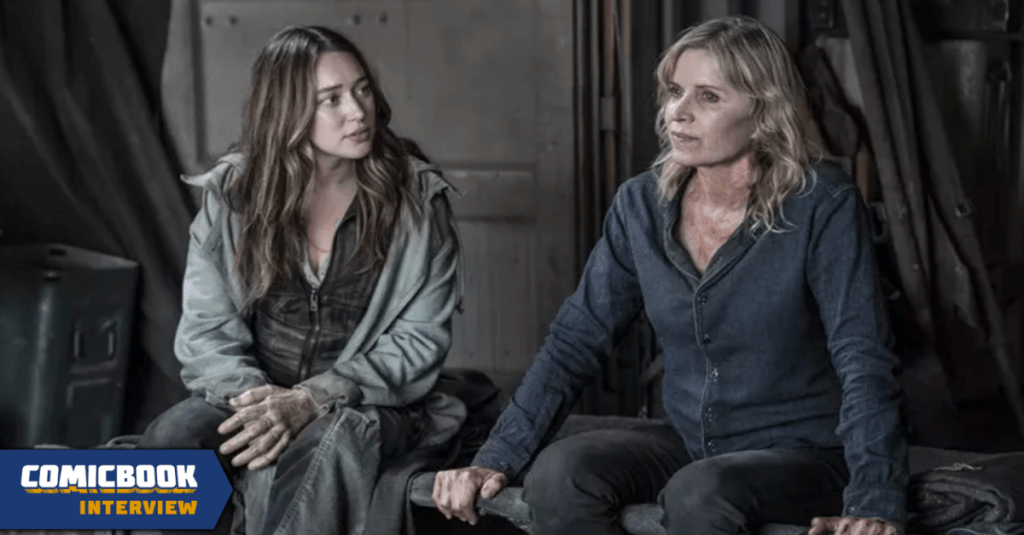[Spoiler alert for the Fear the Walking Dead series finale.] In the end, Fear the Walking Dead was about hope. Sunday’s two-episode series finale ended with a symbolic death (Kim Dickens’ Madison Clark), an actual death (Daniel Sharman’s Troy Otto), and the reveal that a supposed death was a lie (the return of Alycia Debnam-Carey’s Alicia Clark). But there was also life: Victor Strand (Colman Domingo), Daniel Salazar (Rubén Blades), Luciana (Danay García), June Dorie (Jenna Elfman), Dwight (Austin Amelio), Sherry (Christine Evangelista), and Tracy Otto (Antonella Rose) all made it out of Fear alive, with the Clark family legacy living on as MADRE.
Videos by ComicBook.com
Read on for our Fear the Walking Dead postmortem with showrunners Ian Goldberg and Andrew Chambliss. Also read our post-finale Q&A with Kim Dickens and our penultimate episode recap (“Fighting Like You”) and the series finale recap (“The Road Ahead”).
Fear the Walking Dead Finale Ending, Explained: How the Alicia Clark cameo came together
IAN GOLDBERG: It was always a dream of ours, and we had started talking about it in season seven when we knew we were going to bring Madison back onto the show. And we were talking to Alycia about it all the way back then, just planting this seed of an idea that we had for how they would ultimately come back together and reunite in the end. And it’s ultimately why we built season eight the way that we did, and in particular [season] 8B, this question of Alicia and Madison’s legacy. And it felt undeniable to us that the show had to end with a reunion between the two of them. And we are so, so happy that everything worked out.
How Alycia Debnam-Carey returned after departing in Fear TWD season 7
ANDREW CHAMBLISS: It was always a concern that schedules wouldn’t line up, but we just tried to stay in communication with her and keep her up to date on the direction the story was heading. And then as we got closer to the actual production dates, we were fortunately able to work it out. But yeah, she was working on some other shows. She was in Australia, so it was lots of phone calls and just trying to stay up to date, but we made sure that we were going to be able to make it happen because it was that important to us.
On bringing Madison Clark “full circle” to “No One’s Gone”
IAN GOLDBERG: It was very important to me and Andrew as we came into this final season that we were not only bringing stories to a conclusion, but also having this feeling that things were coming full circle for our characters. And when Madison made her heroic sacrifice in season 4, “no one’s gone until they’re gone” was her mantra. It was the thing that she instilled in her kids and was her legacy when they believed that she was dead back then. And her return in season 7 into season 8 is a test of that because the world is, in many different ways, pushing against that for Madison. And I think it’s a struggle for all characters in Fear and across the apocalypse of sort of pragmatism, and what’s safe, and how do you just stay alive versus what’s worth staying alive for and fighting for beyond just survival? And that question drives Madison, ultimately, to a place of deep despair and darkness before she finally realizes that there are things worth fighting for and that there are things that can outlive you if you fight for them. And that legacy survives in her and Alicia and Tracy and all of the characters. So our real goal was to end the series in a place of hope.
ANDREW CHAMBLISS: [The series finale] was all about landing that idea of hope. But I think in addition to that, we want to — without getting too meta — comment on the power of storytelling and how your actions can live on beyond you. And we see that back in season 4, the first time Madison made the sacrifice, how it had this negative impact. But by the time we finally got the story of what happened at the stadium through Al’s [Maggie Grace] interviews, we saw how that was starting to turn around. And here we see something very similar where we see Strand telling the story of what happened at PADRE to Tracy. And ultimately we see how that kind of reignites that small flame of hope in Tracy. And, ultimately, that pays dividends by reconnecting Madison and Alicia. And I think in maybe some ways, maybe subconsciously, we were just commenting on how stories can bring people hope. And I think that’s what we were always kind of setting out to do with Fear: telling stories about people finding hope in a very dark world.
Why Troy Otto had to die
IAN GOLDBERG: I think it’s about testing Madison’s mantra of “no one’s gone until they’re gone.” And in that moment, at the end of episode 11, Madison’s faced with this dilemma of it seems like Troy has changed, it seems that he is worthy of redemption based on his actions. But Madison has seen time and again how you can get burned for that. And I think there’s a real question in her mind of: “Can Troy be trusted? Is it worth the risk?” And in that moment she decides it isn’t, that the more pragmatic choice is to kill him.
And that’s a very dark moment for Madison. But she’s doing it because she believes that’s what she has to do to protect her family. She’s doubting “no one’s gone until they’re gone” at that moment. And the finale is all about bringing her back around to realizing that she was wrong and bringing her back to that place of hope and realizing that her initial philosophy was correct.
On what happens if Madison doesn’t kill Troy
ANDREW CHAMBLISS: I think it’s a very good question and I think it’s one we won’t know the answer to. But I would say I think the one kind of distinction between the Troy that we knew in season 3 and the Troy that we’ve seen change over the course of this back half of season 8 is that he is fighting for his daughter. And I think particularly in the penultimate episode, he’s starting to see the error of his ways and he’s starting to see that maybe just maybe he needs to change for Tracy. So I think there’s a very good chance that he could have changed for Tracy, for Madison, for everyone at PADRE.
What didn’t make it into the Fear finale?
IAN GOLDBERG: The biggest thing about the final episode is that it was huge. And I can’t remember exactly how many days our initial script boarded out to, but it was enormous. I want to say it was like 20 days or something.
ANDREW CHAMBLISS: It was 22 days.
IAN GOLDBERG: 22 days, and we had to squeeze it into 12. So we had a lot of cuts to make. But if you saw that version of the script versus what showed up on screen, it is fundamentally the same story. We just had to make some concessions for production reasons, but the integrity of the story that we wanted to tell, it’s all there. And that did not change.
Will there be a Fear TWD spinoff?
ANDREW CHAMBLISS: I think we were given the freedom to end these characters where we wanted to, and we’re kind given the edict that Fear‘s story should come first. And we really did try to craft these stories so they felt like a satisfying conclusion. But we also wanted to create this feeling that there is a next chapter in all these characters’ lives. Whether or not we see that, that’s a question for Scott [Gimple, TWD Universe Chief Content Officer] and for AMC, but I think there’s definitely lots of room for these characters to continue to grow and develop.
Stay tuned to ComicBook/TWD (and find us on Facebook) for more Fear the Walking Dead series finale coverage.
This interview has been edited and condensed for length and clarity.









